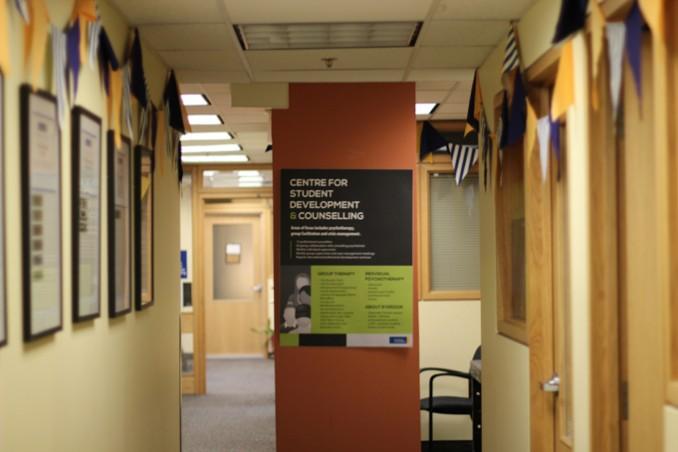By Keith Capstick
Wait times for the school’s counselling services can stretch to three months based on a “triage appointment” assessment, in which students’ personal safety is determined by counsellors.
Students that are not experiencing safety concerns or struggling with day-to-day tasks are asked to wait up to four weeks for an intake appointment after their original triage appointment, on arrival. Once there, they are again assessed and paired with a long-term counsellor. Students struggling with day-to-day tasks have their wait time expedited to one-to-two weeks. Students that are “not experiencing safety concerns” are asked to wait two months or longer.
Students with serious safety concerns and recent trauma are allotted same-week intake appointments. The centre maintains 10 same-day appointment times per week for students in urgent need.
“When you’re dealing with mental illness, every day can feel like the worst day and it can’t always wait,” said Cassidy Allison, a fourth-year RTA school of media student, who waited a month for counselling.
The Ryerson Centre for Student Development and Counselling (CSDC) currently staffs 15 counsellors, an additional two consulting psychiatrists and six graduate students in addition to one psychiatry resident. The staff service more than 30,000 undergraduate students as well as graduate students.
Lavinia Tea — a third-year creative industries student — found that in her experience the staff were helpful once they were available, but said it was evident that the offices “were extremely understaffed.”
“I went to counselling services and at the time the earliest they could have given me for an intake appointment was a month, so I said fine,” Tea said. “The thing with mental illness is that even if you’re deemed low-risk, that can change at any time.”
Tea was originally scheduled to have her intake appointment approximately two months after she first sought out counselling, only to have it cancelled at the last minute and delayed for another month.
Ryerson offers group therapy sessions to speed up wait times for students who are willing to participate. But Tea stressed the importance of finding someone you can build a rapport with and meeting with them right away.
“As a student that’s struggling with mental illness it’s extremely frustrating because I turned to counselling because I felt like I needed to do something now,” Tea said.
Sarah Thompson, the CSDC’s clinical coordinator, said that shortening wait times is one of the centre’s top priorities.
According to Thompson, the CSDC staffs an extra counsellor during the final six weeks of each term to lower wait times during their highest volume weeks, close to exams.
The CSDC is also looking to create as many same-day services for students as possible.
“We continue to explore possibilities for same-day support for students, including the possibility of speaking to someone for 15-20 minutes to receive some immediate supports and next steps,” Thompson said, in a written statement to The Eyeopener. “We’re not there yet, but we know that access to someone who can answer questions and provide direction same day is best.”
Of Toronto’s three major universities, Ryerson and the University of Toronto’s St. George campus have 15 full-time counsellors and York University has 17, although Ryerson is the smallest of the three schools. York also staffs five additional counsellors with a specialization in mental health.
On Jan. 26, RSU vice-president education Cormac McGee has a meeting with the university’s macro finance committee in which he plans to bring students’ biggest concerns to the administration.
One of those concerns, McGee said, is mental health services at Ryerson.
“Wait times at the counselling centre are crazy. Basically, if you’re not in a position to hurt yourself immediately you’re going to wait weeks, sometimes months,” McGee said.
He also added that the diversity of counsellors needs to be addressed, as some students feel the counsellors they’re matched with “can’t understand their lived realities.”













Leave a Reply